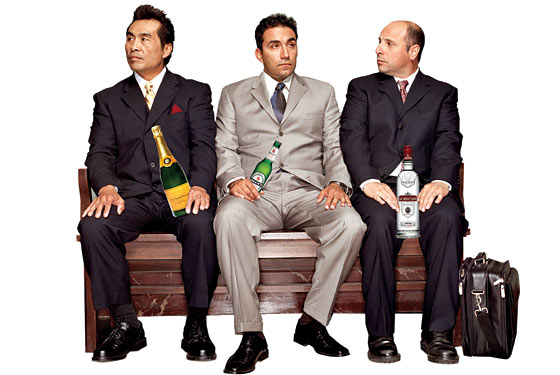
Three bankers of equal accomplishment walk into a bar for a New Year’s refreshment. One orders a bottle of Dom Pérignon, one a double of quintuple-distilled vodka, and the third the cheapest beer on tap. Can you guess which of them works at Goldman Sachs, Morgan Stanley, and Credit Suisse? This would have been a simple riddle in years past. Like the bottles on the bar shelf, investment banks had premium rankings, and financial statements made it easy to figure out who was best suited to pick up the tab. The bar brawl known as the financial panic of 2008 has changed all that. But it hasn’t KO’d the bonus altogether.
Even in a year in which the industry has lost the stock-market-value equivalent of the output of Africa, Wall Street will manage to pay out about half of 2007’s $28.7 billion total. This baffles civilians—but think of Wall Street as a talent business, not all that different from the movies or sports. The Yankees did not make the playoffs, yet they still need to compensate Johnny Damon for his .303 batting average. Goldman Sachs also needs to keep its Damons happy: players like Byron Trott, the mergers consigliere that Warren Buffett relies on. If Goldman doesn’t, you can bet Morgan Stanley, JPMorgan, or Citigroup will.
Pitchfork-wielding taxpayers can cancel the riot for now, however: Only a small portion of bonuses will come in the kind of legal tender that can be spent on Champagne. Morgan Stanley is planning to pay out just a portion of the cash element of its year-end bonuses to staff, subjecting the remainder of the cash to a “claw back”—meaning the rewards can be recouped should performance suffer in coming years. Starting next year at UBS, cash will be held in escrow and can be snagged as a malus (get it—Latin opposite of bonus?) if the bank loses money. In fact, the bulk of all 2008 bonuses for senior Wall Streeters will come as “deferred compensation.” At Goldman, this will take the form of stock options and restricted stock—shares that can’t be sold for a year or more. That’s great if you think Goldman is cheap at around $75 a share, but many thought the stock was cheap at the end of 2007, when it fetched $215. At Credit Suisse, top bankers are receiving weird securities whose worth is derived from a $5 billion pool of dodgy assets.
All of this explains why the old Wall Street hierarchy is a bit muddled, though chances are that if someone does order Dom Pérignon, it’ll be the Goldman guy (while the Credit Suisse guy will be hoping someone else picks up the tab). As for New Yorkers accustomed to all that dumb money flooding the city, finding its way into the pockets of busboys and financing new restaurants in once-forlorn pockets of town, a hint of nostalgia may be in order.
Rob Cox is the U.S. editor of breakingviews.com.
Have good intel? Send tips to intel@nymag.com.